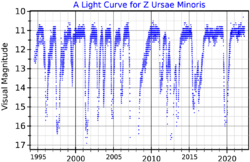Astronomy:Z Ursae Minoris
From HandWiki
Short description: Star in the constellation Ursa Minor
| Observation data Equinox J2000.0]] (ICRS) | |
|---|---|
| Constellation | Ursa Minor |
| Right ascension | 15h 02m 01.36335s[2] |
| Declination | +83° 03′ 48.6299″[2] |
| Apparent magnitude (V) | 10.8 - 19.0[3] |
| Characteristics | |
| Spectral type | C[3] (R[4]) |
| Variable type | R CrB[3] |
| Astrometry | |
| Radial velocity (Rv) | −36.07±0.98[2] km/s |
| Proper motion (μ) | RA: −7.346[2] mas/yr Dec.: +4.322[2] mas/yr |
| Parallax (π) | 0.2159 ± 0.0231[2] mas |
| Distance | approx. 15,000 ly (approx. 4,600 pc) |
| Details | |
| Mass | 0.7±0.2[5] M☉ |
| Luminosity | 7,900+12,000 −4,800[5] L☉ |
| Surface gravity (log g) | 0.5±0.3[5] cgs |
| Temperature | 5,250±250[5] K |
| Metallicity [Fe/H] | −1.85[5] dex |
| Other designations | |
| Database references | |
| SIMBAD | data |
Z Ursae Minoris (Z UMi) is a carbon star and R Coronae Borealis variable in the constellation Ursa Minor.
Z Ursae Minoris was discovered to be a variable star in 1934.[7] It was catalogued as a probable Mira variable, due to its red colour and variations over several hundred days.[8] It was discovered to be a carbon star in a survey published in 1985,[9] and subsequently found also to be hydrogen-deficient.[7] After fading by almost six magnitudes in 1992, it was classified as an R Coronae Borealis variable.[10] It was confirmed as an R Coronae Borealis variable, one of the coolest in the class, after its spectrum was analysed in 2006.[5]
References
- ↑ "Download Data". AAVSO. https://www.aavso.org/data-download.
- ↑ 2.0 2.1 2.2 2.3 2.4 2.5 Vallenari, A. et al. (2022). "Gaia Data Release 3. Summary of the content and survey properties". Astronomy & Astrophysics. doi:10.1051/0004-6361/202243940 Gaia DR3 record for this source at VizieR.
- ↑ 3.0 3.1 3.2 "Z UMi". https://www.aavso.org/vsx/index.php?view=detail.top&oid=37383.
- ↑ Alksnis, A.; Balklavs, A.; Dzervitis, U.; Eglitis, I.; Paupers, O.; Pundure, I. (2001). "General Catalog of Galactic Carbon Stars by C. B. Stephenson. Third Edition". Baltic Astronomy 10 (1–2): 1–318. doi:10.1515/astro-2001-1-202. Bibcode: 2001BaltA..10....1A.
- ↑ 5.0 5.1 5.2 5.3 5.4 5.5 Kipper, Tõnu; Klochkova, Valentina G. (2006). "A Cool R Coronae Borealis Star Z UMi". Baltic Astronomy 15: 531–37. Bibcode: 2006BaltA..15..531K.
- ↑ "Z Ursae Minoris". SIMBAD. Centre de données astronomiques de Strasbourg. http://simbad.u-strasbg.fr/simbad/sim-basic?Ident=Z+Ursae+Minoris.
- ↑ 7.0 7.1 Goswami, A.; Rao, N. K.; Lambert, D. L.; Gonzalez, G. (1997). "On the Hydrogen Deficient Nature of Z UMi". Publications of the Astronomical Society of the Pacific 109: 796. doi:10.1086/133946. Bibcode: 1997PASP..109..796G.
- ↑ Samus, N. N. et al. (2009). "VizieR Online Data Catalog: General Catalogue of Variable Stars (Samus+ 2007-2013)". VizieR On-line Data Catalog: B/GCVS. Originally Published in: 2009yCat....102025S 1: B/gcvs. Bibcode: 2009yCat....102025S.
- ↑ Stephenson, C. B. (1985). "New carbon stars found in a hemispheric survey". The Astronomical Journal 90: 784. doi:10.1086/113787. Bibcode: 1985AJ.....90..784S.
- ↑ Benson, Priscilla J.; Clayton, Geoffrey C.; Garnavich, Peter; Szkody, Paula (1994). "Z Ursa Minoris -- a new R Coronae Borealis variable". The Astronomical Journal 108 (1): 247–50. doi:10.1086/117063. Bibcode: 1994AJ....108..247B.
 |


